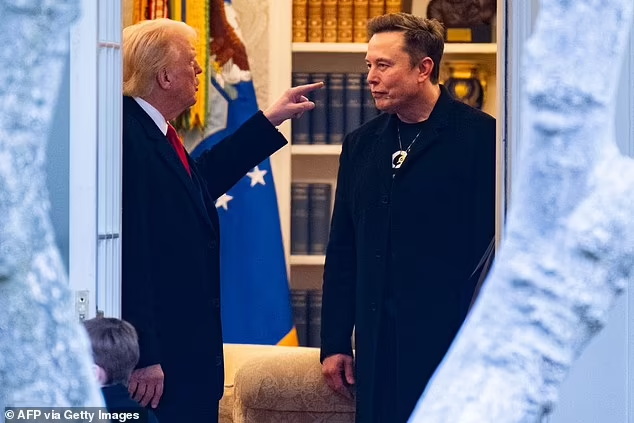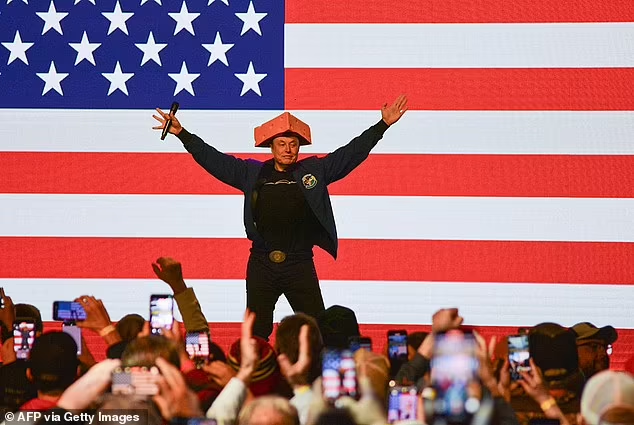Elon Musk, once celebrated as President Donald Trump’s right-hand man and political enforcer, is now facing a rapid and dramatic fall from grace inside the Washington power structure.

Musk was riding high after his appointment as head of the newly created Department of Government Efficiency (DOGE), a federal agency tasked with streamlining government spending and operations. The Tesla and SpaceX CEO promised to trim $2 trillion in federal expenditures and proposed cutting hundreds of thousands of government jobs.
But what began as an ambitious reform mission quickly turned into a political storm. Musk’s aggressive cost-cutting proposals, controversial public remarks, and lack of coordination with top Trump officials have eroded his standing in the administration.
Internal Clashes and Communication Breakdowns
Tensions within Trump’s cabinet mounted after Musk began making bold announcements on his social media platform, X, without prior notice to the White House. Cabinet secretaries, including Secretary of State Marco Rubio, were blindsided by Musk’s DOGE initiatives, leading to strained relationships and accusations of undermining official communication strategies.
One particularly tense Cabinet meeting reportedly ended in a heated argument between Musk and Rubio—an incident that unfolded in front of Trump and Chief of Staff Susie Wiles. The confrontation highlighted broader frustrations about Musk’s unwillingness to collaborate and communicate with fellow officials.
Wiles had been asked by Trump to hold weekly check-ins with Musk to mitigate rising tensions, but even those meetings failed to prevent further discord.
The Pentagon Briefing That Sparked Trump’s Anger
The tipping point came when Musk was cleared to attend a highly classified Pentagon briefing focused on U.S. military plans and China. Though Musk holds significant business interests in China through Tesla, he was scheduled to receive the sensitive intelligence without Trump’s prior knowledge.
The revelation sparked a furious reaction inside the White House. While Trump publicly dismissed the story as “fake news,” sources confirmed that he was privately livid. The president viewed Musk’s involvement as a clear conflict of interest and was angered that he hadn’t been consulted first.

Public Spectacles and Political Fallout
Musk’s penchant for dramatic gestures didn’t help matters. At a major conservative event in February, he took the stage wielding a chainsaw to symbolize his dedication to cutting government waste. The stunt, while attention-grabbing, was widely seen by Trump allies as over-the-top and damaging to the Republican Party’s image.
Senator Lindsey Graham cautioned that the moment would haunt Republicans in the upcoming election cycle. Behind the scenes, Trump aides worried Musk’s antics were making him a political liability.
Musk also stirred controversy when he claimed the U.S. Social Security system still included people aged over 120 years. Though the issue raised questions about database accuracy, Musk’s exaggeration led to further confusion—especially after Trump repeated the claim in a speech without verifying it.
From Ally to Outsider
Despite Musk’s $288 million campaign donation and ongoing personal rapport with Trump, his time in the administration is drawing to a close. Trump has reportedly informed top aides and Cabinet members that Musk will be stepping down from his DOGE leadership role in the coming weeks.
According to *Politico*, Musk will “soon be returning to the business world.” But insiders say he won’t be disappearing entirely. A Trump aide noted, “Anyone who thinks Musk is going to vanish from Trump’s orbit is fooling themselves.” Musk is still expected to visit Mar-a-Lago and maintain direct access to the president.
Mounting Backlash and Business Repercussions
Outside of Washington, the political entanglement is taking a toll on Musk’s business empire. Tesla has already begun to feel the impact of Trump’s 25% automotive tariffs, which went into effect on April 2. Since many of Tesla’s suppliers operate in China and Mexico, the company is now directly exposed to increased costs.
“Important to note that Tesla is NOT unscathed here,” Musk acknowledged in a recent X post. “The cost impact is not trivial.”
Tesla’s global vehicle deliveries also fell by 13% in the first quarter compared to the same period last year, a decline that investors see as partly fueled by consumer backlash over Musk’s government involvement.
Meanwhile, Democrats are seizing the moment to turn Musk into a political foil ahead of the midterm elections—mirroring how Republicans once used Nancy Pelosi to galvanize their base.
A recent NBC News poll found that 51% of Americans hold a negative view of Musk, compared to 39% with a favorable opinion, signaling growing unease with his increasingly polarizing role in American politics.
The White House has yet to publicly comment on Musk’s exit, but his turbulent journey from insider to outsider marks one of the most dramatic political falls of the Trump era.
Credit: Dailymail



